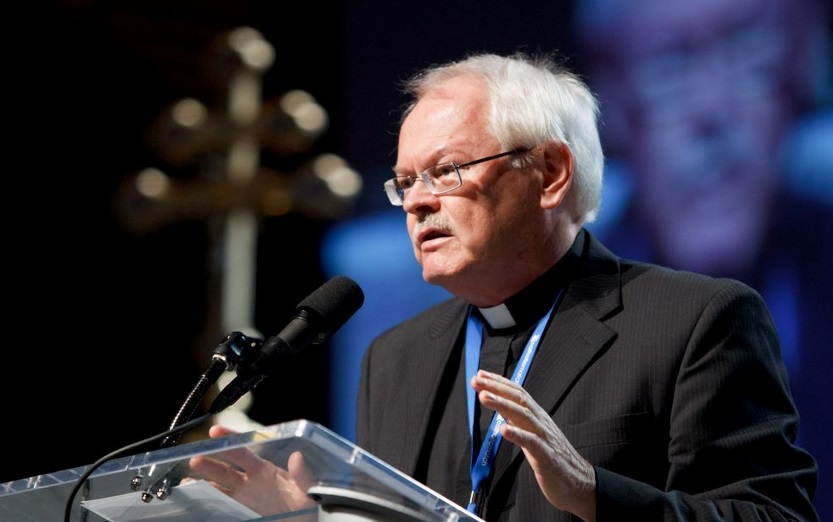Contemplation - Fr Ron Rolheiser
Several years ago, while presenting at a conference at our school, a young priest from Quebec, Pierre-Olivier Tremblay, shared a story (in words to this effect).
I spent some years working with young people and what I noticed with many of them was this. They were young and bursting with energy, with dreams, with hopes, an energy that was wonderful to be around. However, while so full of energy, few of them radiated much hope. They lacked hope because they lacked a meta-narrative. They had only their own stories and when things were going well their energy and spirits were high, but when things went wrong (a breakup in a relationship, a death of a loved one, a serious illness) they had nothing to cling to because they didn’t understand their lives within the context of a bigger story, a meta-narrative. They understood themselves solely within their own individual stories – and that is never a basis for hope.
What is a meta-narrative, a bigger story, within which we need to understand our own story? And how is that the basis for hope?
Here’s an example: Pierre Teilhard de Chardin was both a world-class scientist and a Christian mystic. His intent as a scientist and as a man of faith was to articulate a theological synthesis which would bring together in one harmonious vision, both the divine intent within cosmic evolution and the divine intent in God becoming incarnate in Jesus Christ.
And he articulated such a vision, one within which a Christian could bring together in one harmonious vision, the scientific theories regarding the origins of the universe, the unfolding of evolution through 15 million years, the purpose and role of Christ in history, and how cosmic and faith history will eventually culminate (just as is described in the hymn in the Epistle to the Ephesians) in the fullness of time, where, through Christ, God will bring all things into one in him. And on that day, goodness will forever triumph over evil, love will triumph over division, peace over chaos, empathy over selfishness, gentleness over cruelty, and forgiveness over vengeance.
As he was expounding this vision at a conference, a colleague challenged him with this question. You believe that good will ultimately triumph over evil; well, what happens if we blow up the world with an atomic bomb, what happens to your vision of things then? Teilhard’s answer: if we blow up the world with an atomic bomb, that would be a two-million-year setback; but goodness will triumph over evil, not because I wish it, but because God promised it and, in the resurrection, God showed that God has the power to deliver on that promise.
He’s right. Except for the resurrection, we have no guarantees about anything. Lies, injustice, and violence may triumph in the end. Chaos, cruelty, and death may well be the last word. That’s certainly how it looked the day Jesus died.
However, the resurrection of Jesus is God’s last word on this. In the resurrection, God assures us that no matter how things look, no matter how much evil seems to have the upper hand, no matter how powerless innocence, goodness, and gentleness may look sometimes, no matter how many times our world crucifies Christ, no matter how many times we might blow up the world with an atomic bomb, no matter hopeless it all looks, the ending of our story has been written, and it is a happy ending, an ecstatic one.
The resurrection of Jesus assures us that, as Julian of Norwich affirms, in the end, all will be well, and all will be well, and every manner of being will be well.
The resurrection, God raising up the crucified Jesus in a way that was real, cosmic and corporeal, and not just a shift in the consciousness of his followers, is the basis not just for our hope but for our Christian faith as such. As St. Paul says, if there were no resurrection, we are the most deluded of all people. But, if Jesus was resurrected, everything we believe in and everything we hope for, not least that in the end goodness, love, community, gentleness, and joy will forever triumph over all that opposes them, is assured. The resurrection of Jesus, and that alone, is the basis for all hope, both for ourselves and for the cosmos itself.
The resurrection is the ultimate meta-narrative. This is the bigger story within which we need to set our own individual stories. When Pierre-Olivier Tremblay (now a bishop in Quebec) remarked that the young people he was working with radiated beautiful energy but radiated very little hope because they lacked a meta-narrative within to set their own stories, the meta-narrative he was referring to was precisely the narrative of Jesus’ resurrection from the dead.
Young or old, our own individual stories are not enough. We need to understand ourselves (and the cosmos itself) within the meta-narrative of the resurrection.
(Oblate Fr Ron Rolheiser, theologian, teacher, and award-winning author, is President of the Oblate School of Theology in San Antonio, TX. He writes a weekly column that is carried in over 90 newspapers around the world. He can be contacted through his website www. ronrolheiser.com)








Total Comments:0